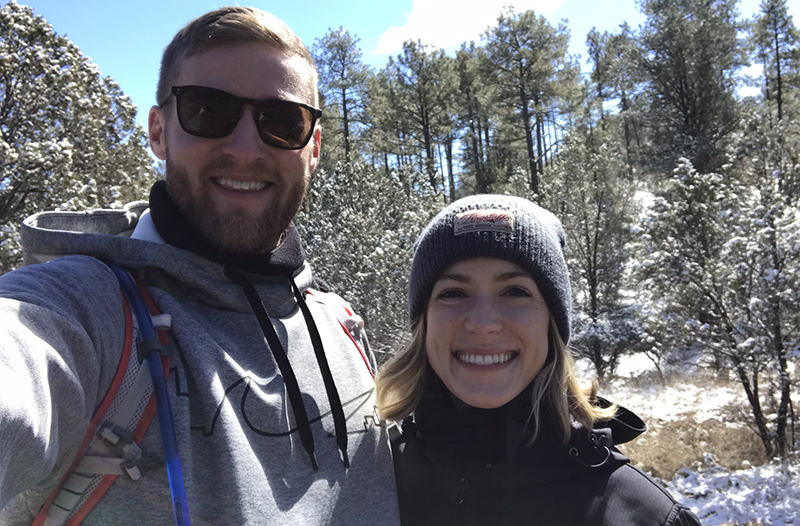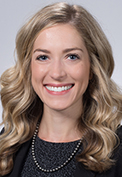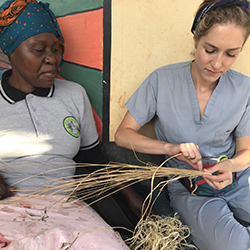
Primary Care Scholarship Profile: Megan Kelly

To address the alarming physician shortage in Arizona, the University of Arizona College of Medicine – Phoenix has accepted eight medical students to receive tuition reimbursement in exchange for a commitment to practice in a rural or urban underserved community in Arizona. The University of Arizona Primary Care Physician Program, developed in partnership with and funded by a portion of $8 million provided by the State of Arizona, is part of the University's commitment to increase primary care providers in underserved communities statewide, and decrease medical student debt. The program was announced in November 2019. Once the program is fully implemented, about 100 students from the Colleges of Medicine (Phoenix and Tucson) could receive the reimbursement.
The UA College of Medicine – Phoenix is profiling several of the students who have committed their careers to primary care.
Meet Megan Kelly

Why Did You Commit to Primary Care?
I decided on primary care during my third-year clerkships. I had enjoyed aspects of each specialty, but continually came back to the principles of Family Medicine and what it means to be a primary care physician. My most meaningful patient interactions repeatedly took place in a primary care setting. The opportunity to truly learn about the person in front of me and the aspects of their life that may play a role in their overall health solidified my decision. I also am in the dual MD/MPH program and felt that the role of the primary care physician coincided with my passion for public health. I felt that I could pursue both interests.
What is the Best Part of Being a Primary Care Physician (PCP)?
Definitely the relationships that develop between patients and their families. I love the opportunity to help a patient become more confident as an advocate for their own health and the chance to take care of multiple generations of one family.
How Would You Explain to Someone Who Doesn't Know Anything About the Primary Care Shortage, Why PCPs are Needed?
Primary care physicians should be the first point of contact for a patient. The reality is that many people must use emergency services as their first point of contact, and the result, along with multiple other factors, is that the United States spends twice as much per person on health care compared to other high-income countries. This coincides with the fact that the U.S. does not have better health outcomes despite the high cost of health care. There are many potential complex solutions to our health care problems, but the emphasis on primary care is an important step. In Arizona, there is a shortage of more than 500 primary care providers, particularly in critical access areas, and by 2030 there will be a shortage of almost 2,000.
Why are PCPs Important to the Community?
PCPs influence population health, improve access to care and provide important education to patients who are trying to navigate a confusing system. They can also challenge the trajectory of a person's health by introducing preventative strategies into their routine and can act as a partner in decision making for challenging situations.
Why Do Medical Students Choose Not to Go into Primary Care?

What Does It Mean to be Selected for This Program?
I am excited for the opportunity to participate. It is important that the medical community pay greater attention to the physician shortage, especially in those areas where there are large gaps in access to health care. It is wonderful that the University of Arizona acknowledges this issue and is taking tangible action. As far as how it will help me in my medical school journey, I am graduating in May and will soon have to reconcile with the large amount of debt that has accrued over the past four years. This scholarship gives me some solace that I will be able to pursue my passion within primary care and begin to chip away at the debt.
Why Did You Choose the College of Medicine – Phoenix?
I chose the College of Medicine – Phoenix because of the culture, the location in my hometown, and the access to so many high-quality resources and clinical sites. I am very happy with my decision and feel that I have received an excellent education.
About the College
Founded in 2007, the University of Arizona College of Medicine – Phoenix inspires and trains exemplary physicians, scientists and leaders to advance its core missions in education, research, clinical care and service to communities across Arizona. The college’s strength lies in our collaborations and partnerships with clinical affiliates, community organizations and industry sponsors. With our primary affiliate, Banner Health, we are recognized as the premier academic medical center in Phoenix. As an anchor institution of the Phoenix Bioscience Core, the college is home to signature research programs in neurosciences, cardiopulmonary diseases, immunology, informatics and metabolism. These focus areas uniquely position us to drive biomedical research and bolster economic development in the region.
As an urban institution with strong roots in rural and tribal health, the college has graduated more than 1,000 physicians and matriculates 130 students each year. Greater than 60% of matriculating students are from Arizona and many continue training at our GME sponsored residency programs, ultimately pursuing local academic and community-based opportunities. While our traditional four-year program continues to thrive, we will launch our recently approved accelerated three-year medical student curriculum with exclusive focus on primary care. This program is designed to further enhance workforce retention needs across Arizona.
The college has embarked on our strategic plan for 2025 to 2030. Learn more.